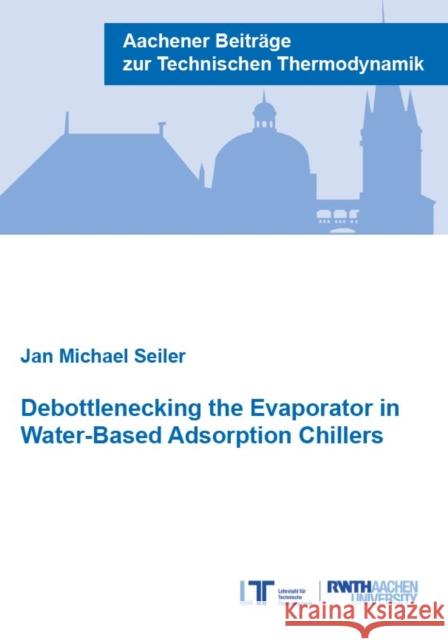Debottlenecking the Evaporator in Water-Based Adsorption Chillers » książka
Debottlenecking the Evaporator in Water-Based Adsorption Chillers
ISBN-13: 9783958864078 / Niemiecki / Miękka / 2021 / 250 str.
Global cooling demand continues to grow. To mitigate the resulting environmental impact, cooling solutions need to be sustainable. Adsorption chillers can provide sustainable cooling as they can employ both environmentally friendly driving forces such as solar or waste heat and the natural refrigerant water. Water offers many advantages as refrigerant: its global warming potential is zero, it is absolutely safe, cheap, broadly available and has a high enthalpy of vaporisation. However, there are also challenges to employ water as refrigerant in cooling applications. On the one hand, efficient sub-atmospheric evaporation of water is challenging. On the other hand, the freezing point of water limits its operational range to temperatures above 0°C, thereby excluding many cooling applications. Both bottlenecks of the natural refrigerant water are addressed experimentally in this thesis: (I) Sub-atmospheric, thin-film evaporation of water enables efficient heat transfer and is investigated using capillary-assisted heat exchangers. (II) The limitation towards temperatures above 0°C is overcome by adding the anti-freezing agent ethylene glycol to the evaporator of an adsorption chiller, and the feasibility of operation is demonstrated. The experiments regarding sub-atmospheric evaporation aim at understanding capillary-assisted, thin-film evaporators to improve their heat transfer performance. First, the employed experimental setup is validated by comparing results of identical experiments using two setups. The comparison allows to identify influencing factors for experimental studies of sub-atmospheric, thin-film evaporation in general. Experiments with continuously decreasing filling levels are experimentally assessed since the procedure allows to analyse all filling levels in a single experiment. Next, the validated experimental setup and procedure are employed to analyse the evaporation performance of 7 coated tubes that create capillary action for thin-film evaporation on their surfaces. By correlating surface properties to evaporation performance for different coatings and experimental conditions, favourable surface properties and testing conditions are derived. Water-based adsorption cooling below 0°C is investigated in a one-bed adsorption chiller. The impact of adding ethylene glycol as an anti-freezing agent to the evaporator is assessed at different working conditions and the resulting process performance is evaluated. Challenges regarding successful implementation in commercial systems and future integration of thin-film evaporation for process improvement are discussed. Thus, both discussed bottlenecks are overcome, thereby enabling even further exploration of the outstanding properties of the natural refrigerant water.











